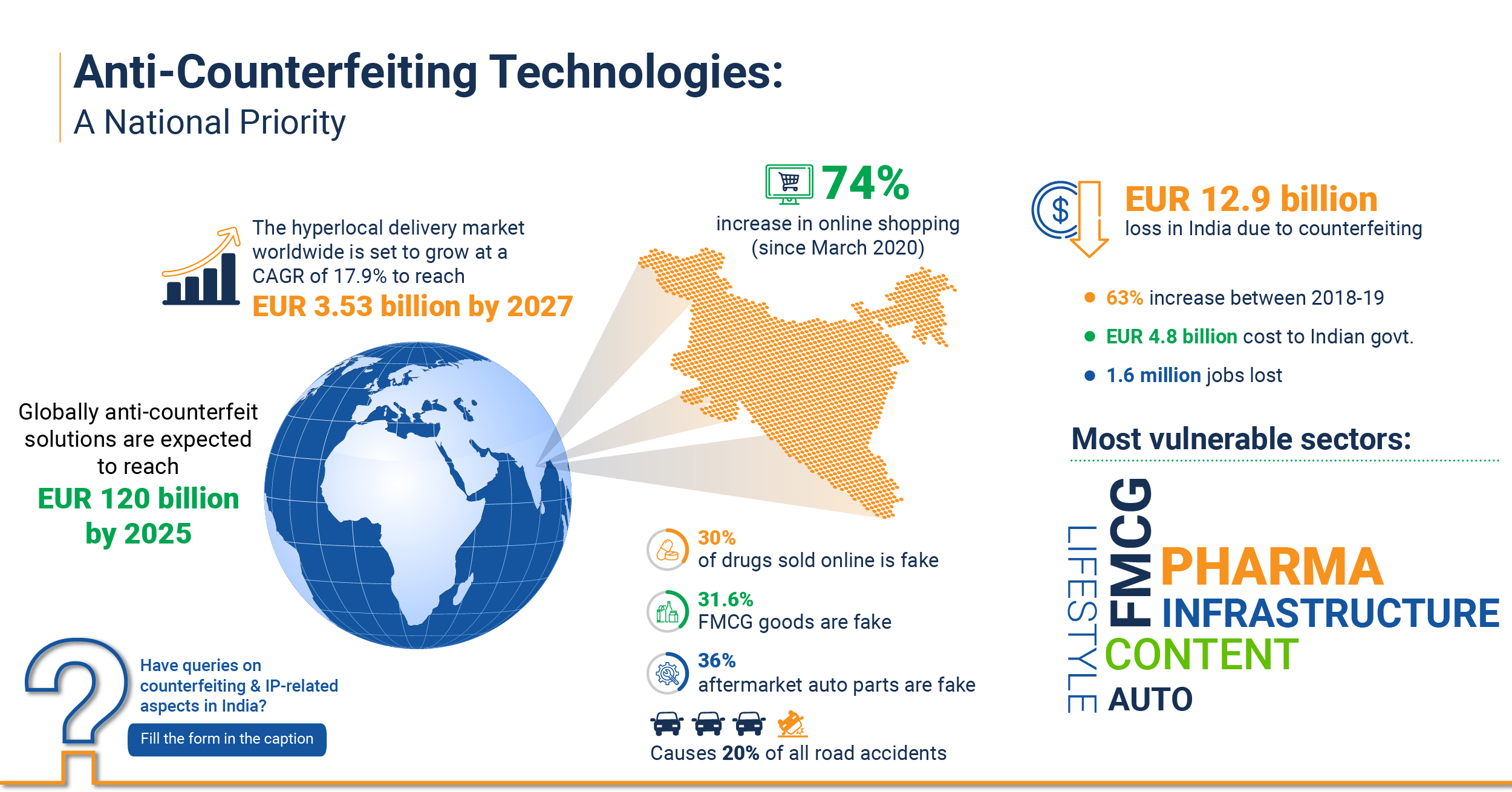Shwetabh Raj | 28th July 2022

The global economic value of counterfeit goods is at EUR ~2.23 trillion. In India too, there is a loss of EUR 12.9 billion in seven manufacturing sectors and a loss of EUR 4.8 billion to the government due to illicit markets. The total employment loss in the economy is about 1.6 million. 1 Despite this, India’s overall growth and massive consumption market makes the country an extremely attractive destination for European companies.
The pandemic has greatly enhanced the use of technology across sectors. In fact, since March 2020, purchases made online have increased by 74% globally. Despite the plethora of new opportunities created by the rapid growth of digital technologies, it can also be used to create and sell counterfeit products.
Considering this, it is critical for all companies across sectors to invest in methods to prevent counterfeiting by third parties. Globally, investment on anti-counterfeiting solutions is estimated to reach EUR 120 billion by 2025.

This is especially true for the EU companies and SMEs either already present in India or exploring internationalisation to the Indian market. As leaders in innovation and sustainable technologies, protection of IP rights holds tremendous importance for such high potential opportunities.
1- Secure IP Protection in the relevant target market: To face the challenge of counterfeiting and infringement it is advisable for the European companies to secure relevant IP rights in the form of trademark, patents, copyright or industrial design. These rights restrict any third party from manufacturing, selling or using the products, technology or a brand name without the prior permission of the IP owners. The IP protection further creates an enforcement right wherein the IP owner can claim damages against party infringing the IP rights.
2- Embrace Technology: In a country like India, it is difficult to physically monitor and identify the counterfeiting activity. Thereby, businesses can leverage technology to identify counterfeiting and infringement and help them to secure evidence to stop counterfeiters. Other than that, the IP owners can utilize distinctive patterns or packaging that can be detected only with a special device. Numerous high-tech solutions allow you to authenticate your goods and uncover counterfeiting. As these solutions are quick and it helps in ascertaining the area from where counterfeiting originated therefore it puts the brand owners in an advantageous position to deal with the counterfeiters.
3- Regular Market Surveys: In order to deal with the menace of counterfeiting, the IP owners should carry out regular market checks or surveys. This can be achieved either by setting up their own anti-counterfeiting department or with the help of risk consulting firms which focus on the brand protection activities, or combination of both approaches depending on the budget of the company and scope and frequency of the infringement.
4- Support of Law Enforcement Agencies: Once the European companies have established goodwill in the Indian market and are facing the issue of counterfeiting, it is advisable for them to engage with the law enforcement authorities such as the Police, Customs or Excise and make them aware of the loss suffered by the brand due to counterfeiting. The IP owners can approach the authorities to educate them about the distinct features of their brand or products which can enable them to take Suo Moto action against the counterfeiters involved.
5- Customer Empowerment: Counterfeits and infringed goods can affect the goodwill of a brand and can leave a lasting impression on a customer who may not buy the product again. The IP owner should make it easy for the customers to identify and report knockoffs. Providing information like specific product descriptions can be an easy way to empower the buyers in identifying the counterfeit product. In case they believe they bought a counterfeit version of the product, they should be able to report the concern easily.
India IP SME Helpdesk is a a first-line IP assistance service for European/COSME SMEs that operate or intend to access the Indian market and look to improve their global competitiveness. The Helpdesk enables them to protect and enforce their Intellectual Property (IP) rights in or relating to India by providing free information and services which comprise jargon-free, first-line, confidential advice on intellectual property and related issues, as well as training, materials and online resources.
The programme allows such businesses to book free consultations with IP experts in India and also address specific queries relating to these issues.
counterfeiting, infringement, INDIA